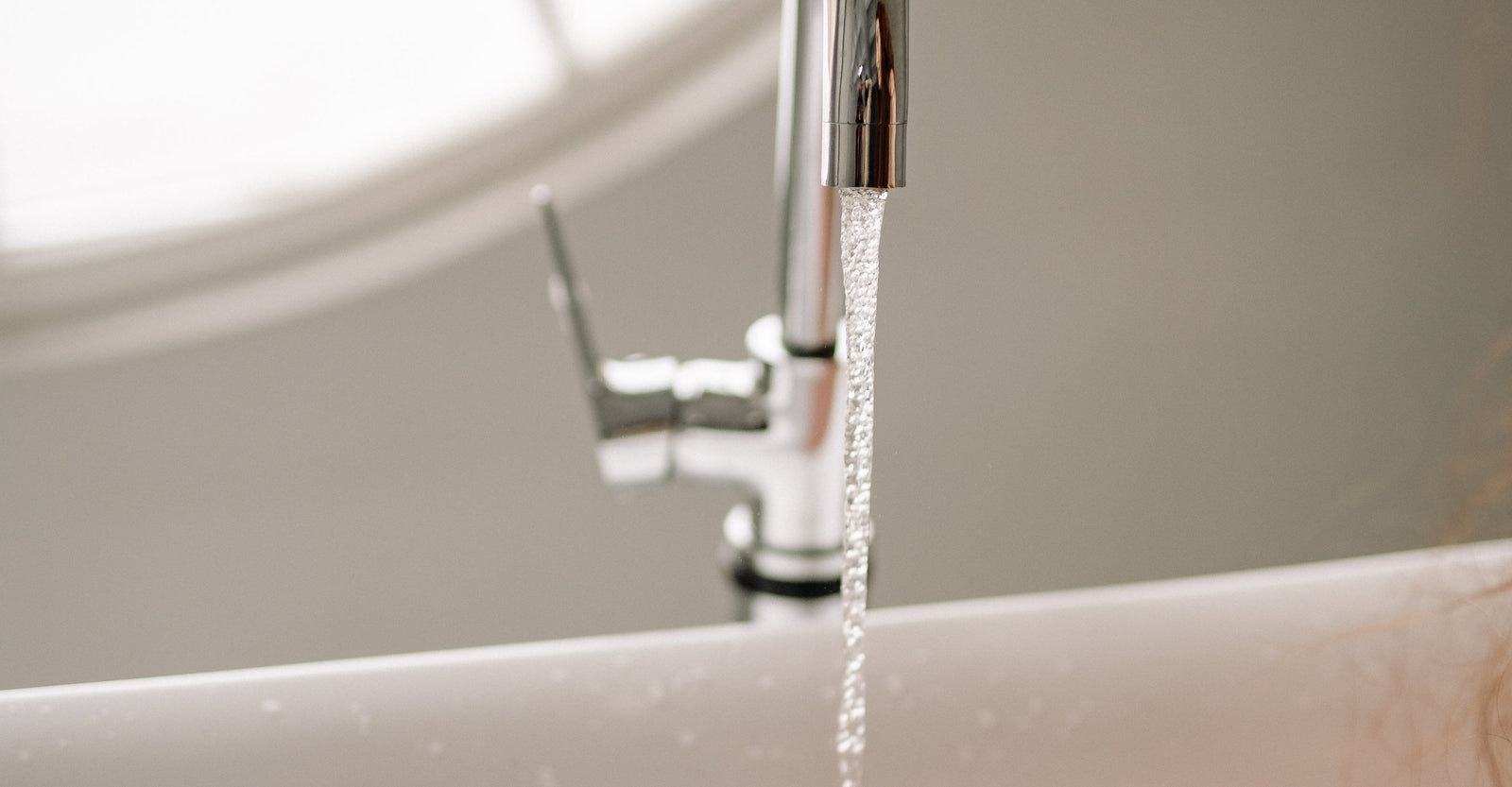HARD WATER AND YOUR SKIN
Hard water is water that contains high concentrations of dissolved minerals, primarily calcium and magnesium ions. The effects of hard water on the skin can vary from person to person, but it is generally considered less favorable for skin healthcompared to soft water, which has lower mineral content. Below, we discuss how water becomes hard, how to test and control it, and what its effects are on the skin.
TESTING AND CONTROLLING FOR HARD WATER
Water hardness varies by region and depends on the source of the water for each community. In rural communities and neighborhoods, it is common to have private wells that provide water while in larger cities and most of the U.S., a public water system that draws from ground and surface water is used. Every community should have an annual water report available online and there are a number of databases where water hardness can be looked up by zip code. A number of affordable testing methods like strips or drops are available to test the water in your specific household.
Whether the water comes from a private well or public source, it is the elements present in the earth of our local watershed (central collection point of groundwater) that dissolve in the water as it travels through the ground and into collection. For example, regions where there is a lot of limestone, chalk or gypsum have harder water. While treatment systems are in place for both public and private water sources, hard water still makes it into our households and may affect our skin and the products we put on it. Besides an extra source of calcium or magnesium, there don’t appear to be any major positive or negative health effects of consuming hard water [1]. However, hard water creates mineral deposits on everything it contacts, including our skin.
EFFECTS OF HARD WATER ON SKIN
- Dryness and Irritation: The minerals in hard water can interact with soap and skincare products, making it more difficult to rinse them off completely. This can leave a residue on the skin, which may lead to dryness and irritation. Soap scum can also clog pores, potentially contributing to acne or exacerbating existing skin conditions [2].
- Reduced Lathering: Hard water can interfere with the ability of soap to lather effectively. This may result in people using more soap or shower products than necessary, which can further dry out the skin.
- Film and Buildup: Hard water can leave a mineral buildup on the skin over time. This can create a film or residue that makes the skin feel less clean and less smooth [3].
- Eczema and Dermatitis: Some individuals with sensitive skin or preexisting skin conditions like eczema may find that hard water exacerbates their symptoms. The mineral content in hard water can irritate the skin and trigger flare-ups [4–6].
- Hair and Scalp Issues: Hard water can have similar effects on the hair and scalp, leaving the hair feeling dry, brittle, and difficult to manage. It may also contribute to issues like dandruff.
- Decreased Effectiveness of Skincare Products: Skincare products, such as cleansers and moisturizers, may be less effective in hard water because they do not lather well or may not be properly absorbed by the skin.
CONCLUSION
To mitigate the effects of hard water on the skin, individuals can consider using a water softener system, which reduces the mineral content in the water. Additionally, using gentle skincare products, like mild cleansers and moisturizers, can help minimize the impact of hard water. It's also important to thoroughly rinse off soap and shampoo and consider using water filters for your shower head and sink to reduce the mineral content in the water.
SOURCES:
[1] Pop MS, Cheregi DC, Onose G, Munteanu C, Popescu C, Rotariu M, Turnea M-A, Dogaru G, Ionescu EV, Oprea D, Iliescu MG, Minea M, Stanciu LE, Silișteanu SC, Oprea C (2023) Exploring the Potential Benefits of Natural Calcium-Rich Mineral Waters for Health and Wellness: A Systematic Review.Nutrients 15, 3126.
[2] Warren R, Ertel KD, Bartolo RG, Levine MJ, Bryant PB, Wong LF (1996) The influence of hard water (calcium) and surfactants on irritant contact dermatitis.Contact Dermatitis 35, 337–343.
[3] Danby SG, Brown K, Wigley AM, Chittock J, Pyae PK, Flohr C, Cork MJ (2018) The Effect of Water Hardness on Surfactant Deposition after Washing and Subsequent Skin Irritation in Atopic Dermatitis Patients and Healthy Control Subjects.J Invest Dermatol 138, 68–77.
[4] Henning MAS, Ibler KS, Ullum H, Erikstrup C, Bruun MT, Burgdorf KS, Dinh KM, Rigas A, Thørner LW, Pedersen OB, Jemec GB (2021) The association between water hardness and xerosis—Results from the Danish Blood Donor Study.PLoS One 16, e0252462.
[5] Lopez DJ, Singh A, Waidyatillake NT, Su JC, Bui DS, Dharmage SC, Lodge CJ, Lowe AJ (2022) The association between domestic hard water and eczema in adults from the UK Biobank cohort study.Br J Dermatol 187, 704–712.
[6] Jabbar-Lopez ZK, Ung CY, Alexander H, Gurung N, Chalmers J, Danby S, Cork MJ, Peacock JL, Flohr C (2021) The effect of water hardness on atopic eczema, skin barrier function: A systematic review, meta-analysis.Clin Exp Allergy 51, 430–451.
